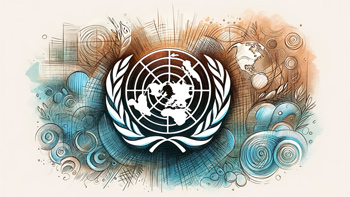The United Nations (UN), an international organization established in 1945, is a cornerstone of modern international relations. Created in the aftermath of World War II, its primary aim is to maintain international peace and security, develop friendly relations among nations, and promote social progress, better living standards, and human rights. The UN's role and influence have evolved over the decades, adapting to the changing dynamics of global politics and international relations.
Formation and Historical Context
The United Nations was conceived during World War II, with the idea of creating a body to prevent future global conflicts. The name "United Nations" was first coined by United States President Franklin D. Roosevelt and was officially established on October 24, 1945, after the ratification of the UN Charter by the five permanent members of the Security Council - the United States, the United Kingdom, France, the Soviet Union, and China - and a majority of other signatories. This date is celebrated annually as United Nations Day.
Structure and Organs of the United Nations
The UN's framework comprises several principal organs, including the General Assembly, the Security Council, the Economic and Social Council, the International Court of Justice, the UN Secretariat, and the Trusteeship Council (inactive since 1994). Each organ has distinct functions and responsibilities, ranging from the deliberation of international issues to peacekeeping and humanitarian assistance.
The General Assembly
The General Assembly is the main deliberative organ of the UN, where all member states have equal representation. It provides a unique forum for multilateral discussion of international issues, including peace and security, economic and social development, and international law. The Assembly meets annually in regular sessions and special sessions can be convened to address urgent matters.
The Security Council
The Security Council is charged with maintaining international peace and security. It has 15 members, including five permanent members with veto power (the United States, the United Kingdom, France, Russia, and China) and ten non-permanent members elected for two-year terms. The Council’s decisions, such as imposing sanctions or authorizing the use of force, are binding on UN members.
Specialized Agencies and Programs
The UN system also includes a range of specialized agencies and programs, each focusing on specific areas such as health (WHO), education (UNESCO), children (UNICEF), and refugees (UNHCR). These entities work globally to implement policies and programs that advance the UN's goals.
Peacekeeping and Conflict Resolution
One of the most visible roles of the UN is peacekeeping and conflict resolution. UN peacekeepers are deployed to conflict zones to enforce ceasefires, protect civilians, and assist in political processes. These missions, often operating in challenging environments, play a crucial role in stabilizing conflict-affected regions.
Human Rights and Humanitarian Efforts
Upholding and promoting human rights is a central focus of the UN. Through various conventions and declarations, notably the Universal Declaration of Human Rights, the UN works to advocate and protect the rights of individuals worldwide. Additionally, its humanitarian agencies provide critical aid in response to emergencies, such as natural disasters and refugee crises.
Challenges and Criticisms
Despite its achievements, the UN faces numerous challenges and criticisms. Issues such as the veto power of permanent Security Council members, the representation of member states, bureaucracy, and effectiveness in conflict resolution are ongoing concerns. The organization must continually evolve to address these challenges and remain relevant in the changing international landscape.
The United Nations stands as a symbol of international cooperation and a testament to the collective efforts of nations to build a peaceful and prosperous world. Its initiatives and programs have significantly impacted global affairs, making it an indispensable part of the international community. As global challenges become more complex, the role of the UN in fostering international collaboration and problem-solving becomes ever more crucial.
